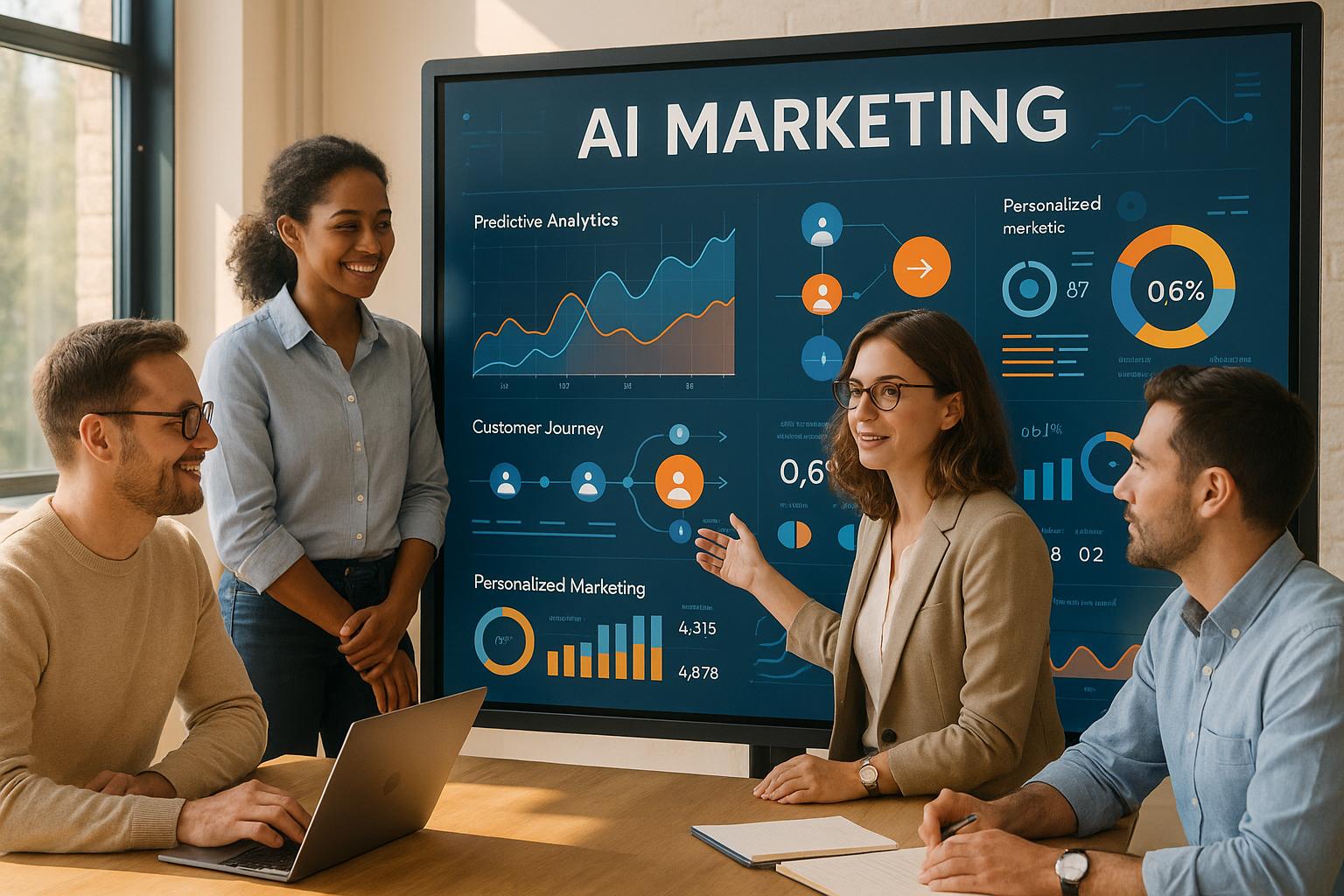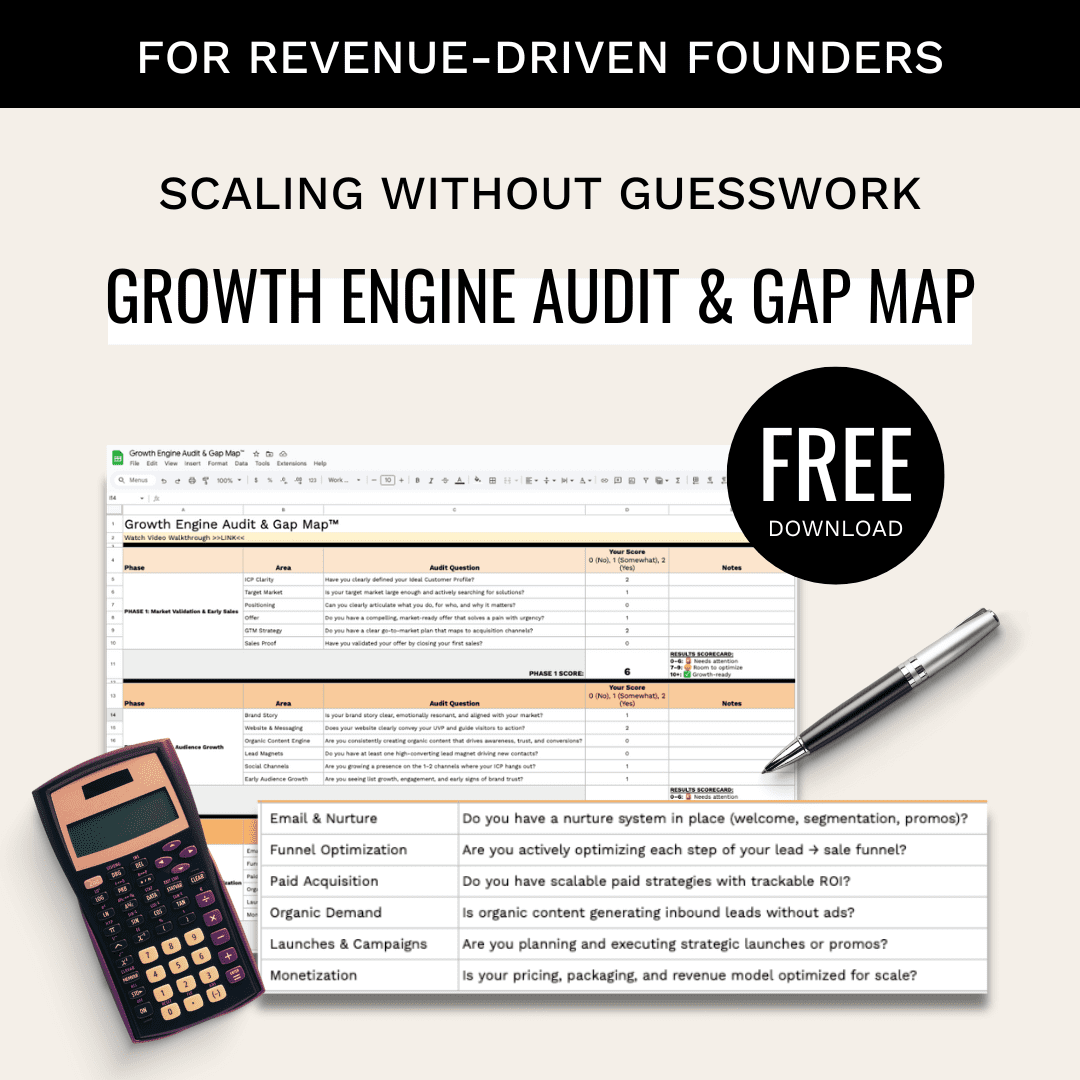AI marketing companies are transforming how businesses connect with customers. Here’s what you need to know:
- Key Stats: By 2024, 72% of businesses adopted AI, and 54% of marketers integrated it into workflows. AI-driven personalization boosts ROI by 80% and can amplify returns by 5–8x.
- Trends: Major trends include personalization at scale, campaign automation, AI content creation, and predictive analytics.
- Tools: Popular tools include customer journey automation platforms, AI content generators, and predictive lead scoring tools, helping businesses save time and improve targeting.
- Market Growth: The AI marketing industry is projected to grow from $15.84 billion in 2022 to $107.5 billion by 2028.
- Opportunities & Risks: While AI offers opportunities like hyper-personalization and predictive analytics, challenges include content homogenization, cybersecurity risks, and loss of authenticity.
AI isn’t replacing human creativity – it’s enhancing it. Companies that embrace AI responsibly and train teams to use it effectively will stay ahead in this growing market.
How AI is Transforming Marketing Forever: Latest Trends and Tools Explained
Market Trends Driving AI Marketing Company Growth
The AI marketing sector is experiencing explosive growth, with projections showing an increase from $15.84 billion in 2022 to $107.5 billion by 2028. This surge is fueled by shifts in how businesses engage with customers. Four major trends are shaping this evolution, pushing AI marketing companies to deliver results that traditional methods struggle to achieve. Let’s dive into the forces driving this transformation.
Personalization at Scale
There’s a clear gap in the market: while 71% of consumers expect personalized offers, only 34% actually receive them. By 2025, 80% of consumer interactions will rely on data, and 61% of executives believe personalization is crucial for growth.
Take Telmore, a Danish telecom provider. In 2024, they used AI to create personalized customer experiences, leading to an 11% boost in sales compared to generic approaches. Frederik Scholten, Telmore’s CMO, shared:
“We’re moving from optimizing for broad audiences to tailoring experiences for individuals. This shift drives more relevant offers, encouraging customers to explore additional services or even switch from competitors.”
Similarly, TSB Bank leveraged real-time data to customize loan offers based on recent customer behavior. The result? A 300% increase in mobile loan sales and a leap in in-app sales from 24% to 75%. Emma Springham, TSB’s CMO, explained:
“Banking is deeply personal. More than many other industries, it impacts customers’ lives profoundly. Personalized digital experiences allow us to build stronger, more meaningful connections with those who trust us to manage their money.”
However, personalization comes with its challenges. While 88% of consumers want assurance that their data is handled responsibly, only 49% of organizations meet this expectation. This gap underscores the importance of prioritizing data security to build trust.
Campaign Automation
Today’s consumers demand seamless interactions – 78% expect it, but only 45% of brands deliver. AI-powered campaign automation is bridging this divide.
The numbers speak for themselves: marketing automation delivers $5.44 for every dollar spent, yet 37% of potential customers drop off due to lack of engagement. AI tools streamline ad placements, adjust bids in real time, and synchronize messaging across multiple platforms, ensuring campaigns remain relevant and effective.
But AI’s impact doesn’t stop at automation. It’s also transforming how content is created, as we’ll explore next.
AI Content Creation
AI is revolutionizing content creation, removing bottlenecks and speeding up processes. 53% of executives report higher efficiency, and 50% note faster idea generation thanks to generative AI.
Ron Friedman, Vice President at Mattel Future Lab, highlighted the shift:
“Generative AI acts as a creative partner, helping us brainstorm and refine ideas quickly. It allows us to get concepts on paper – or screens – faster, enabling immediate feedback and better collaboration.”
Vanguard saw similar success. Amanda Forte shared how AI-powered content creation led to:
“Faster product launches and personalized website updates. This resulted in a 264% jump in organic traffic and a 176% boost in quality engagement on our new site.”
Still, AI isn’t a replacement for human ingenuity. Christen Jones, Executive Creative Director at Inizio Evoke, emphasized:
“Generative AI isn’t a one-click fix. Skilled professionals, like copywriters, are essential to ensure brand consistency and audience connection.”
The takeaway? AI accelerates creative workflows but relies on human expertise to maintain authenticity and quality.
Predictive Analytics for Better Marketing Decisions
Predictive analytics is becoming a cornerstone of modern marketing. By 2025, 65% of senior executives will credit AI and predictive analytics as key growth drivers, and 75% of top-performing marketing teams will rely on these tools.
At its core, predictive analytics uses historical data to forecast future outcomes. Pierre DeBois, Founder and CEO of Zimana, explained:
“Predictive analytics turns your past marketing data into actionable insights about what’s coming next.”
This approach helps companies predict customer lifetime value, identify high-converting leads, refine pricing strategies, and even anticipate churn. Armed with these insights, marketing teams can allocate resources more effectively and design campaigns that resonate deeply with their target audiences.
AI Tools and Technologies Used by Marketing Companies
Advanced AI tools are reshaping how marketers operate, enabling precise customer targeting and automating complex decisions. Today, over 80% of marketers globally rely on AI tools in their strategies, with 45% of marketing executives specifically leveraging AI for content creation. According to McKinsey, AI technologies have the potential to generate between $1.4 trillion and $2.6 trillion in value for marketing and sales worldwide.
The most impactful AI tools in marketing can be grouped into three main categories, each solving challenges that traditional methods often struggle to address.
Customer Journey Automation Platforms
Customer journey automation platforms streamline key touchpoints to boost conversions, offering scalable and effective marketing strategies. Companies using these platforms report impressive results, such as a 451% increase in qualified leads. Additionally, businesses that integrate multiple touchpoints through automation have seen customer satisfaction rise by up to 20% and operational costs drop by as much as 40%.
These platforms excel at mapping complex customer interactions across channels like email, social media, websites, and mobile apps. By analyzing behaviors such as abandoned carts or past purchases, they trigger personalized messages at just the right moment. For instance, welcome emails generate 320% more revenue per email than other promotional emails, and AI-powered product recommendations contribute 10-30% of e-commerce revenues.
In March 2022, Michaels Stores, a crafts retailer, implemented AI-driven automation to personalize 95% of its campaigns, up from 20%. This shift led to a 41% increase in SMS click-through rates and a 25% boost in email campaign performance.
“Almost 90% of customers say the experience a company provides is as important as its products and services.” – Salesforce
The real strength of customer journey automation lies in its ability to deliver personalized experiences at scale, minimizing manual effort. But while automation enhances customer engagement, AI is also transforming content creation.
AI Content Generators
AI content generators have changed how marketing teams produce materials like copy, blogs, social media posts, and video scripts. These tools meet the demand for scalable, personalized marketing content. In fact, generative AI could boost marketing productivity by 5-15%, adding up to $463 billion in value annually.
From writing assistants to video creation platforms, these tools cater to a variety of content needs, with subscription plans typically ranging from $30 to $50. For example, a European telecom company used generative AI to create hyper-personalized messages for 150 audience segments, achieving a 40% lift in response rates and cutting deployment costs by 25%. Similarly, an Asian beverage company used ChatGPT and text-to-image tools to develop 30 detailed product concepts in just one day – a process that used to take a year.
However, success with these tools requires thoughtful integration. A SurveyMonkey study revealed that 51% of tech-savvy marketing teams use AI to optimize email campaigns and SEO, with 65% seeing improved SEO outcomes as a result.
Clarke Boyd, founder of Novela, highlighted the competitive edge AI provides:
“I do think there’s an opportunity for us to upskill to get a lot more done and be more successful. It’s a competitive edge right now to know how to use AI better than other people. So we need to develop new skills.”
While content optimization is crucial, predictive tools are also helping marketers refine their lead-targeting strategies.
Predictive Lead Scoring Tools
Predictive lead scoring tools use machine learning to analyze historical data and identify which prospects are most likely to convert. Unlike traditional point-based systems that rely on static rules, these platforms adapt in real time, learning from customer behavior patterns.
AI-driven lead scoring can boost ROI by 20-30% compared to traditional methods. This is because sales teams can prioritize high-probability leads, avoiding wasted efforts on unqualified prospects. Solutions like Seventh Sense, which integrates with platforms like HubSpot for $80 per month, analyze factors such as email engagement, website activity, demographic details, and purchase history to build detailed lead profiles.
These tools are particularly valuable for companies managing large lead volumes or navigating complex sales cycles. Additionally, 88% of marketers report improved personalization through AI, and 33% of U.S. marketers cite time-saving as the biggest advantage of AI and machine learning tools. By automating lead qualification, sales teams can focus more on building relationships.
The benefits extend beyond immediate sales. Referred customers often have a 16% higher lifetime value, and predictive scoring can identify which leads are most likely to become loyal advocates. With 92% of businesses planning to invest in generative AI within the next three years, companies that master these tools now will position themselves for success in an increasingly competitive market.
sbb-itb-e8c8399
Top AI Marketing Companies and Their Differences
As AI continues to reshape the marketing world, the companies driving this change are evolving too. The AI marketing space is divided into two main categories: established leaders offering comprehensive platforms and nimble startups delivering specialized solutions. With the global AI marketing market projected to hit $20.4 billion in 2024 and grow at an annual rate of 25% through 2030, understanding these differences is key to picking the right partner for your business needs.
Established players focus on all-in-one platforms that handle multiple functions, while startups excel in addressing specific challenges with tailored solutions. Let’s take a closer look at both groups to see what sets them apart.
Established AI Marketing Leaders
The big names in AI marketing rely on deep research, vast data resources, and proven methodologies to deliver robust, multi-channel solutions.
- Amsive: With its “Audience Science™” methodology, Amsive helps businesses maximize ROI through advanced analytics. For example, an East Coast bank achieved a 316% ROI boost and 1.75x growth in new checking deposits using Amsive’s real-time data analysis.
- Appier: Since its founding in 2012, Appier has been serving around 1,000 brands across 14 markets, including Taipei, Tokyo, and Bangkok. Their AI platforms are built to optimize marketing campaigns and personalize customer experiences on a large scale.
- GumGum: Specializing in attention-based advertising, GumGum uses its “Mindset Platform™” and “Verity™” technology for contextual intelligence. This focus allows them to thrive against both generalist and specialist competitors.
These companies excel at managing complex, multi-channel campaigns for large enterprises. Their strength lies in offering end-to-end solutions, from strategy development to implementation and ongoing optimization.
New Startups Changing AI Marketing
Startups, on the other hand, bring agility and focus to the table. They often target specific pain points that larger companies might overlook, using cutting-edge innovations to deliver standout results.
- BrightBid: By leveraging existing data and integrating Google Ads with HubSpot, BrightBid helped Eletive double its Google Ads conversions within three months, reaching 150 conversions by the seventh month.
- Single Grain: This startup uses generative AI for content creation and SEO. Working with Winedeals, they boosted click-through rates by 0.6%, increased clicks by 268%, and improved blog page rankings by 11.7% in just six months.
Other startups are also making waves with their specialized approaches:
- Pecan AI: Founded in 2018, Pecan AI focuses on predictive analytics, enabling businesses to analyze large datasets across 15 countries. The startup has raised over $117 million in venture capital, highlighting investor confidence in niche AI solutions.
- Oolo AI: Established in 2020, Oolo AI specializes in customer service powered by natural language processing and machine learning. Their tools offer personalized recommendations for in-app purchases and subscriptions, serving customers in nine countries.
- NeoReach: Taking a unique angle, NeoReach focuses on influencer marketing with AI-driven fraud detection, addressing a specific challenge that broader platforms might not prioritize.
What sets startups apart is their ability to quickly adopt new technologies and pivot strategies as needed. As Christina Inge, author of Marketing Analytics: A Comprehensive Guide, puts it:
“There is a saying going around now – and it is very true – that your job will not be taken by AI. It will be taken by a person who knows how to use AI.”
Ultimately, businesses need to align their growth goals and risk tolerance with the type of provider that best fits their strategic vision. Whether it’s the comprehensive capabilities of established leaders or the focused innovation of startups, the right partner can make all the difference.
Future of AI Marketing: Opportunities and Risks
The world of AI marketing is evolving at a breakneck pace. The industry is projected to surge from $12.05 billion in 2020 to $47.32 billion in 2025, and an impressive $107.5 billion by 2028. With a compound annual growth rate of 36.6% expected between 2024 and 2030, this growth opens up a world of possibilities – but it also introduces some serious challenges.
Growth Opportunities in AI Marketing
Over the next few years, AI is expected to transition from being a tool for automating tasks to becoming a strategic partner that reshapes how businesses make decisions and innovate. Several trends are set to redefine the marketing landscape:
AI Agents
AI agents are no longer just chatbots – they’re becoming critical to daily operations. According to Deloitte, by 2025, 25% of enterprises using generative AI will integrate AI agents into workflows to improve decision-making.
Hyper-Personalization
Personalization has moved beyond basic demographic data. For instance, in 2025, Nike boosted its e-commerce conversion rates by 35% using a strategy that analyzed customer behavior across mobile apps, websites, and physical stores. This approach also led to a 3× increase in mobile app engagement, a 28% drop in wasted ad spend, and a 40% rise in customer lifetime value.
Answer Engine Optimization (AEO)
AI-powered search tools are changing how marketers approach content. Strategies now focus on optimizing for featured snippets, AI-generated summaries, and voice search, offering fresh ways to connect with customers.
Predictive Analytics
AI-driven predictive analytics are helping businesses anticipate customer behavior and spot trends before they become obvious. Companies that adopt these tools early are gaining an edge by staying ahead of shifting consumer preferences.
Generative AI
Generative AI is revolutionizing content creation and customer engagement. A whopping 92% of businesses plan to invest in generative AI tools within the next three years, and 67% of top-performing companies are already leveraging these tools for product and service innovation.
Industry Risks and Challenges
While the opportunities are exciting, the rapid adoption of AI in marketing also brings risks that businesses must address to grow responsibly and maintain trust.
Content Homogenization
As more companies use similar AI tools, the risk of producing generic content increases, which could weaken brand differentiation.
“As marketers rely more on AI to generate content, homogenization begins to occur. This is the direct opposite of the purpose of branding, which requires differentiation and authenticity as a core component.”
– Jen Iliff, WunderLand
Intellectual Property and Copyright Issues
The legal gray areas surrounding AI-generated content pose financial and reputational risks for brands.
“The biggest risk of using generative AI in marketing is the unclear situation regarding intellectual property and copyrights. Brands should, therefore, (at least for the moment) use generative AI for research, inspiration or fine-tuning, but not blindly use AI-generated texts, images or audio content.”
– Rafael Schwarz, TERRITORY Influence
Cybersecurity Threats
Generative AI is creating new vulnerabilities. Seventy-seven percent of cybersecurity leaders are deeply concerned about its impact, with 73% planning to increase their security budgets. Deloitte predicts that AI-enabled fraud losses in the U.S. could jump from $12.3 billion in 2023 to $40 billion by 2027.
Loss of Authenticity
Relying too heavily on AI-generated content can result in impersonal customer experiences, eroding trust and loyalty.
“Excessive reliance on AI in marketing risks diluting authenticity. Mitigate by integrating human oversight, ensuring AI output meets quality standards and prioritizing genuine relationships with media and stakeholders. Both tech innovation and a human touch are key for lasting impact.”
– Katie Jewett, UPRAISE Marketing + Public Relations
These risks highlight the importance of thoughtful, strategic approaches to AI adoption.
How Business Leaders Should Prepare
To navigate these challenges and seize the opportunities AI offers, business leaders need to act decisively. A balanced approach that combines innovation with risk management is essential.
- Evaluate your AI strategy: Review your current capabilities and competitive landscape to develop a clear roadmap for adopting AI.
- Modernize your data: Invest in cleaning, integrating, and managing your data to create a solid foundation for AI-driven marketing.
- Upskill your team: Train employees to refine AI outputs, maintain brand voice, and integrate AI tools into existing workflows.
“Your job will not be taken by AI. It will be taken by a person who knows how to use AI.”
– Christina Inge, Instructor at the Harvard Division of Continuing Education’s Professional & Executive Development
- Adopt responsible AI practices: Establish clear policies on data privacy, transparency, and bias. Set up ethics committees to ensure AI delivers long-term value while minimizing risks.
- Start small: Experiment with AI tools on a limited scale to evaluate their effectiveness before making larger investments.
- Emphasize human-AI collaboration: Combine the strengths of human creativity with AI’s efficiency to unlock new possibilities.
The businesses that succeed in this evolving landscape will be those that treat AI as an ally, not a replacement. By focusing on customer needs, maintaining authenticity, and upholding ethical standards, companies can harness AI’s potential while preserving the human touch that builds lasting connections.
Conclusion: How AI Marketing Companies Are Evolving
AI marketing companies are reshaping the way businesses operate. The industry has grown from $12.05 billion in 2020 to a projected $107.5 billion by 2028, signaling a clear shift toward automated, data-driven solutions that deliver personalized experiences on a massive scale. This growth highlights how companies are increasingly prioritizing measurable and practical benefits.
Today, 88% of digital marketers rely on AI for their daily tasks. This widespread adoption is producing real results, with organizations using AI in marketing shifting 75% of their staff from repetitive tasks to more strategic roles. By letting AI handle routine operations, businesses can focus on creativity and big-picture strategies – a blend that combines human ingenuity with machine efficiency.
The impact is hard to ignore. Companies using AI report a 20% boost in profits, while personalized algorithms drive a 50% increase in leads. Adidas offers a compelling example: by leveraging AI-powered personalization, they achieved a 259% jump in average order value from new users and a 50.3% rise in mobile conversion rates.
As competition intensifies, the message is clear: ignoring AI could leave businesses lagging behind. To stay ahead, companies need to act strategically. Start by identifying clear goals and auditing the quality of your existing data. Select AI tools that tackle your biggest challenges and integrate smoothly with current systems. Pilot projects can help demonstrate value before scaling up, and equipping your team with the skills to work alongside AI is crucial.
The stakes are high, with 92% of businesses planning to invest in generative AI tools within the next three years. The real question isn’t whether to adopt AI – it’s how quickly and effectively you can implement it while preserving the human connection that builds lasting customer loyalty.
The future of marketing lies in the thoughtful integration of AI. By combining the analytical precision of machines with the creativity and empathy of people, businesses can maintain the personal touch that drives meaningful customer relationships and long-term success.
FAQs
How can businesses protect customer data while using AI for personalized marketing?
To ensure customer data remains secure while using AI for personalized marketing, businesses should implement several key strategies. Start by incorporating privacy-by-design principles, meaning data protection measures are embedded into AI systems right from the start. Regular risk assessments are a must, along with staying compliant with regulations like GDPR and CCPA to steer clear of legal troubles.
Another crucial step is practicing data minimization – only collect the data you truly need for personalization. Pair this with anonymization techniques to protect customer identities. On top of that, invest in secure data storage solutions and implement strong cybersecurity measures, like encryption and strict access controls, to guard against breaches. Together, these practices help businesses achieve a balance between effective AI-driven personalization and maintaining robust data security.
What are the risks of relying too much on AI for content creation, and how can businesses address them?
Over-relying on AI for content creation can lead to bland messaging, misaligned communication, and even legal troubles like plagiarism or copyright issues. AI tools often struggle to grasp the full picture – context, tone, or cultural subtleties – leaving content that can feel detached or fail to resonate with your audience. On top of that, when dealing with complex or sensitive topics, AI might generate material that’s inappropriate or even offensive.
To minimize these risks, businesses should prioritize human oversight in the content creation process. Regularly reviewing AI-generated content helps maintain quality, accuracy, and alignment with your brand’s voice. Providing clear style guidelines and training AI with brand-specific data can make the output more relevant and consistent. Additionally, conducting periodic audits ensures the content is free from plagiarism and complies with copyright regulations.
How can predictive analytics enhance marketing strategies, and what steps should businesses take to successfully implement these tools?
Predictive analytics has the potential to reshape marketing strategies by enabling businesses to predict customer behavior, fine-tune campaigns, and provide deeply personalized experiences. By diving into historical data, companies can spot patterns and trends that help them make smarter decisions. The result? More precise targeting, stronger audience engagement, and a better return on investment as marketing efforts align more closely with what customers actually want.
To make predictive analytics work effectively, businesses should focus on a few key steps:
- Define clear objectives: Be specific about what you aim to achieve with predictive analytics.
- Consolidate data from multiple sources: Pull together information from various channels to get a well-rounded view.
- Select the right tools: Choose analytics tools that suit your business needs and goals.
- Test and tweak models: Use real-world performance as a guide to refine your predictive models.
It’s also crucial to keep a close eye on performance and make ongoing adjustments. This ensures the tools stay relevant and continue to deliver meaningful results over time.
Related Blog Posts
- AI Agents in Marketing: The Secret to Driving 10x Engagement & Conversions
- 5 Ways AI Can Optimize Marketing ROI for your Tech Startup
- 10 AI Personalization Tools for Personalized Marketing
- AI Growth Marketing: Forecasting Use Cases




